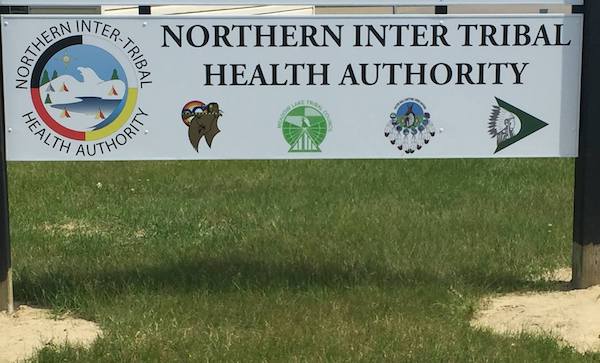
Northern Inter-Tribal Health Authority asking province for better communication
The Northern Inter-Tribal Health Authority (NITHA) is speaking out about a shortage of personal protective equipment (PPE) in its centres during the COVID-19 outbreak.
The First Nations-driven organization—which is independent from the Saskatchewan Health Authority (SHA)—is a partnership between the Prince Albert Grand Council, Meadow Lake Tribal Council, Peter Ballantyne Cree Nation and Lac La Ronge Indian Band.
According to Executive Director Tara Campbell, NITHA isn’t getting a clear answer about how much PPE is available in the province and if the government will consider them when they have the appropriate supply.
“There’s just a lot of uncertainty,” she said.
Personal protective equipment includes masks, gloves and gowns. SHA CEO Scott Livingstone said on Monday that the province is not currently short of this equipment.
Campbell said ongoing inventory assessments suggest 40 per cent of NITHA’s health sites don’t have the proper PPE to respond to the outbreak.
Of the equipment set aside for emergencies, she said much of it is expired and can’t be used.
“I think we should be involved a lot more,” said Campbell about the province’s response to the COVID-19 pandemic.
“We wish we would be able to have other avenues to talk to the province, whether it’s the ministry or the SHA.”
Campbell explained that NITHA works with Indigenous Services Canada (ISC) to submit PPE orders through the province.
In an emailed response, the Ministry of Health said it’s been working with NITHA, ISC and the SHA “to better coordinate their efforts and ensure an effective response to COVID-19 in communities across Saskatchewan.”
It said federal officials have expressed concerns that the needs of First Nations communities are reflected in Saskatchewan through the Federal/Provincial/Territorial Collaborative Procurement order.
On Mar. 26, read the statement, officials from NITHA, ISC and the Ministry of Health discussed the needs of First Nations communities, including in northern Saskatchewan.
“Follow up action allowed the provincial order to be revised to include information from ISC and NITHA, and a revised order was submitted by the province on Mar. 30.”
The Ministry of Health went on to say the federal government has been shipping PPE, but not in the quantities ordered.
“The SHA has provided some urgently needed items, such as testing swabs, to address immediate needs,” it said.
NITHA confirmed it received the swabs on Apr. 1, although some sites can’t safely use them for testing until they have new PPE.
Campbell emphasized NITHA recognizes that there’s a global shortage of PPE; however, Board Chair Chief Carolyn Bernard wanted to bring more attention to the issue in rural communities.
“The impact of this disease would be devastating, and we are asking for clear communication from the provincial and federal governments that our populations in our member communities will not be left out of the process,” said Bernard in a media release.
NITHA Medical Health Officer Dr. Nnamdi Ndubuka confirmed on Monday that his public health unit has reported a total of three COVID-19 cases within its communities.
Although this is a low number, said Campbell, one case could quickly turn into hundreds.
“We have a different population up in northern Saskatchewan,” she said, explaining that many have to travel three or four hours for health care.
Additionally, she said, many of their communities are facing overcrowded housing.
“One case can have three contacts and those three contacts can have their own three contacts. You can imagine how fast it would spread in a community of 1,200 people.”
But, said Campbell, the shortages date back to the end of last year long before the pandemic was declared.
“With the flu season, normally we’re putting in orders or the communities are putting in orders through their normal channels in October, November, but as early as December they were already getting notifications that things would be on back order or it’s delayed.”
NITHA represents 33 First Nations communities. Of the total population of 55,000 people it represents, nearly half are living on-reserve.
The news release said NITHA made PPE requests to ISC and the Ministry of Health on a per capita basis.
It included a 72-hour surge request for 41,000 masks, both procedure and N95, and face shields, 1,300 boxes of nitrile gloves, 8,000 surgical gowns, 30,000 hand sanitizers and 5,000 swab kits.
It also included an eight-week surge request for 765,000 masks, both procedure and N95, and face shields, 24,000 boxes of nitrile gloves, 149,000 surgical gowns, 60,000 hand sanitizers and 93,000 swab kits.
NDP pushing province to work closer with northern communities
The Saskatchewan NDP echoed NITHA’s concerns in a Tuesday media release.
The NDP called on the provincial government to work closely with northern communities to ensure the proper protections and protocols are being put in place to limit the spread of the virus.
“Some communities are wanting to restrict access, and many are concerned about liquor stores remaining open. The province has so far been inconsistent in providing clear direction or support,” said Buckley Belanger, highways critic and NDP MLA for Athabasca.
“We need the provincial government first to communicate more and then to do more to keep our communities safe and healthy.”

